#George W Bush administration
Photo

They say we're lucky as we have freedom of thought and no censorship. This old gruesome post wasn't even in the flagged posts box.
#Iraq War#invasion of Iraq#middle east#War on terror#oil#George W Bush administration#US imperialism#War in Iraq#Obama administration#war on terrorism#Baghdad#civilians#military–industrial complex#US army#children#XXI century#US military interventions#torture#genocide#war crimes#crimes against humanity#manslaughter#murders#kidnapping#human rights violation#Abu Ghraib#shock and awe#Joe Biden#Guantanamo Bay prison#Tony Blair
23 notes
·
View notes
Text

Everyone knows about Lincoln and Garfield and McKinley and Kennedy, the quartet of America Presidents who fell victim to assassination. Even the most casual observers of Presidential history can probably name the four Presidents who were murdered while in office, and many even know the names of the four assassins responsible for their deaths: Booth, Guiteau, Czolgosz, and Oswald.
There have also been quite a few (in)famous unsuccessful assassination attempts, where Presidents barely escaped with their lives, that many Americans are familiar with, including (but not limited to):
•Richard Lawrence's miraculously unlucky double misfire on the steps of the U.S. Capitol in 1835 which left Andrew Jackson unharmed but resulted in Lawrence -- who would be found not guilty by reason of insanity -- getting viciously pummeled by the cane-wielding President Jackson until Davy Crockett intervened to save the would-be assassin from the 67-year-old President.
•The shooting of former President Theodore Roosevelt in Milwaukee as he sought another term in the White House during the 1912 Presidential election. Despite being shot in the chest, Roosevelt decided to go ahead and deliver his campaign speech before being taken to the hospital where doctors discovered that the bullet lodged inside of TR had first passed through a case for his eyeglasses and the thick pages of his speech in his jacket's pocket, lessening the damage from the gunshot.
•The attempted assassination of President-elect Franklin D. Roosevelt in Miami in February 1933, just seventeen days in before FDR's Inauguration, which wounded four people and killed Chicago Mayor Anton Cermak.
•The ill-fated 1950 attempt by Puerto Rican nationalists to storm Blair House (the temporary Presidential residence during the renovation of the White House) and kill President Harry S. Truman as he was napping. Truman was not hurt, but a White House Police Officer and one of the two assassins were killed during the wild shootout.
•President Gerald Ford's trouble with two California women who separately tried to kill him in Sacramento and then San Francisco just two weeks apart in September 1975.
•The shocking shooting of President Ronald Reagan in broad daylight from just a few yards away as he exited the Washington Hilton following a speech in March 1981, which left four people wounded and very nearly killed the 70-year-old Reagan just two months into his Presidency.
But what is amazing is that, in this age of instant information and the constant regurgitation of media coverage via the 24-hour news cycle, very few Americans know that there is a man sitting in prison in the former Soviet Republic of Georgia for attempting to assassinate President George W. Bush. What even less Americans realize is how close Vladimir Arutyunian actually came to accomplishing his task.
On May 10, 2005, President Bush spoke to a large crowd at an outdoor rally in Tbilisi, Georgia. In one of the photos at the top of this post, Bush is seen speaking from the stage in Tbilisi. The other photo is of Arutyunian holding a plaid handkerchief close to his chest. Wrapped in that handkerchief was a live hand grenade.
As President Bush spoke, nearby sat his wife, Laura, Georgian President Mikheil Saakashvili, and the Dutch-born First Lady of Georgia, Sandra Roelofs. They had no idea that, during the speech, Arutyunian tossed his handkerchief-wrapped grenade towards the stage. The grenade landed just 61 feet away from President Bush, well within range of causing serious injury, if not death.
Of course, the grenade did not explode. At first, it was thought to be a dud, but upon closer inspection it was discovered that the only reason the grenade didn't explode was because Arutyunian's handkerchief -- used to conceal the explosive as he stood in the crowd -- was wrapped too tightly around the grenade, preventing the firing pin from deploying. A Georgian security official noticed the grenade, grabbed it quickly and disposed of it as Arutyunian disappeared into the massive crowd and President Bush continued speaking.
After Bush's speech was over and once it was recognized that the President had only narrowly escaped a legitimate attempted assassination, Georgian police worked closely with the United States Secret Service, the FBI, and the U.S. Justice Department to investigate the assassination attempt and find the would-be assassin who seemingly melted into Tbilisi after his brazen, albeit unsuccessful attempt on Bush's life. Using DNA evidence and tips from informants, the Georgian police ultimately tracked down Arutyunian two months later. When they went to arrest Arutyunian, a gunfight broke out and Arutyunian killed Zurab Kvlividze, a top counterterrorism official with Georgia's Interior Ministry. Arutyunian was wounded before finally being captured with the assistance of Georgian Special Forces.
The Georgians tried Arutyunian on the murder of the police officer, as well as the attempted assassinations of President Bush and President Saakshvili. Arutyunian was sentenced to life in prison with no possibility of parole. A federal grand jury in the United States also indicted Arutyunian on the federal charge of the attempted assassination of the President of the United States, which is a felony. The U.S., however, has not attempted nor has any potential plans to extradite the failed assassin from Georgia, and Arutyunian will almost certainly spend the rest of his life in a Georgian prison.
#History#Presidents#Presidential History#Presidential Assassinations#Presidential Assassination Attempts#George W. Bush#President Bush#Bush 43#Bush Administration#Presidency#Georgia#Tbilisi#Mikheil Saakshvili#Vladimir Arutyunian#Attempted Assassination of George W. Bush#Presidential Assassins#Assassination Attempts#Assassins#Unsuccessful Assassination Attempts#Politics#Georgian History#European History#Assassinations#Failed Assassination Attempts#Richard Lawrence#Andrew Jackson#President Jackson#Theodore Roosevelt#John Schrank#Attempted Assassination of Theodore Roosevelt
102 notes
·
View notes
Text
George W. Bush, the infamously anti-gay and neoconservative former U.S. president who invaded Iraq on a lie, has criticized congressional Republicans for threatening to defund the U.S. President’s Emergency Plan for AIDS Relief (PEPFAR), a largely successful African HIV-prevention program that he launched back in 2003. “There is no program more pro-life” than PEPFAR, he wrote.
Though PEPFAR is estimated to have saved over 25 million lives, its funding is set to expire on September 30. Congressional Republicans are falsely claiming that the program promotes abortion and using its re-funding as a bargaining chip in budget negotiations. Republicans have threatened to defund the entire federal government at the end of the month unless they’re allowed to slash military diversity programs and military aid to Ukraine and to increase anti-immigration measures at the U.S.-Mexico border.
“We are on the verge of ending the HIV/AIDS epidemic. To abandon our commitment now would forfeit two decades of unimaginable progress and raise further questions about the worth of America’s word,” Bush wrote in a Wednesday opinion article in The Washington Post.
Bush said that his Secretary of State Condoleezza Rice, his White House chief of staff Joshua Bolton, and his senior policy advisor Michael Gerson had advised him to begin PEPFAR. Gerson reportedly told Bush that it would be “a source of national shame” if the U.S. didn’t try to help end the worldwide HIV epidemic.
Bush’s opinion article cited words that Gerson himself had written in defense of PEPFAR in November 2017: “Are Republicans in Congress prepared to squander a legacy of GOP leadership that has won the United States considerable goodwill around the world? Among evangelical Christians, what definition of being ‘pro-life’ does not include saving millions of lives from preventable disease and death?”
Adding his own thoughts, Bush wrote, “There is no program more pro-life than one which has saved more than 25 million lives. I urge Congress to reauthorize PEPFAR for another five years without delay.”
During his presidency, Bush backed a constitutional amendment against same-sex marriage, and used bans on same-sex marriage to help him win re-election in 2004. While he served, 27 states banned same-sex marriage.
Despite Bush’s anti-gay record, PEPFAR was “a sound investment in U.S. security,” Ben Plumley, the former CEO of the now-defunct international HIV organization Pangea, said in a now-deleted interview with Hornet.com. Plumley said the program “generated very significant goodwill towards the United States” and countered “the spread of radical Islam or radical anti-Western attitudes in sub-Saharan Africa.”
Plumley also noted that most HIV transmissions in sub-Saharan Africa are heterosexual, meaning that conservative Republicans could support PEPFAR without worrying about seeming too overtly supportive of the LGBTQ+ community.
#us politics#news#lgbtq nation#2023#republicans#conservatives#president george w. bush#U.S. President’s Emergency Plan for AIDS Relief#pepfar#hiv/aids#hiv/aids epidemic#africa#world politics#the washington post#Condoleezza Rice#Joshua Bolton#Michael Gerson#Ben Plumley#bush administration#Hornet.com#us congress#congressional Republicans
157 notes
·
View notes
Text
The biggest benefactor to Hamas in the US is not the radical chic fringe but Republican former President George W. Bush.
Because of recency bias, many people have forgotten what an awful president George "Dubya" Bush was. But in addition to two recessions (including the Great Recession), two rounds of tax breaks for the filthy rich, neglecting national security which led to 9/11, and starting an unnecessary and destabilizing war in Iraq, Bush helped to bring the terrorist group Hamas to power in Gaza.
Gaza has not had an election since 2006 – one which was instigated by George W. Bush. That election turned out to be a disaster.
It was in January 2006 that the Palestinian territories held what turned out to be their last parliamentary elections. Hamas won a bare plurality of votes (44 percent to the more moderate Fatah party’s 41 percent) but, given the electoral system, a strong majority of seats (74 to 45). Neither party was keen on sharing power. Fighting broke out between the two. When a unity government was finally formed in June 2007, Hamas broke the deal, started murdering Fatah members, and, in the end, took total control of the Gaza Strip. Those who weren’t killed fled to the West Bank, and the territories have remained split ever since.
In other words, Hamas’ absolute rule of Gaza is not what the Palestinians voted for back in 2006. In fact, since the median age of Gazans is 18, half of Hamas’ subjects weren’t even born when the election took place. Since they have known no alternative, have absorbed little information but Hamas propaganda, and have witnessed periodic outbursts of violent conflict with Israel throughout their lives, it is impossible to know what they really think about their rulers.
But we need to ask another question: Why did the 2006 elections take place? The explanation lies in the political ideals—or, more correctly, the naïveté—of President George W. Bush. (Much of this comes from the reporting for my 2008 book, Daydream Believers: How a Few Grand Ideas Wrecked American Power.)
Bush entered his second term, in January 2005, convinced that his mission was to spread democracy around the world. He assumed that democracy was the natural state of humanity: Once a dictator was toppled and the people could vote for leaders in elections, freedom and liberty would bloom forth. For a moment, it looked like he might be right: The world was witnessing the Orange Revolution in Ukraine, the Cedar Revolution in Lebanon, the first parliamentary elections in post-Saddam Iraq. More pertinent, the Palestinian National Authority held its first election, and Mahmoud Abbas’ Fatah party—which had recognized Israel’s right to exist and supported negotiations for a two-state solution—won handily.
Around this time, Israel was withdrawing from the Gaza Strip—not just pulling out troops, but evicting some 8,000 Jewish settlers (most of whom were paid to resettle in the West Bank). Suddenly there was a vacuum of local authority. Bush thought democracy would fill a vacuum, so he urged the Palestinian Authority to hold parliamentary elections.
Create a power vacuum and the most determined group, not the most appropriate group, will rush in to fill the void. That happened to be Hamas.
One problem, though: Radical parties—notably Hamas and Islamic Jihad, which had boycotted the 2005 presidential election—decided to compete in the 2006 parliamentary contests.
Six weeks before these elections, Dennis Ross was on one of his frequent trips to the Middle East. As the Middle East envoy for Presidents Bill Clinton and George H.W. Bush, Ross had more experience negotiating with Israelis and Palestinians than any American. He was no longer in the U.S. government, but he knew all the relevant players.
Ross was leery about holding elections. He thought that if there were elections, militias such as Hamas should be banned from participating; they should have to choose between joining the system and waging violence against it—they shouldn’t be allowed to have it both ways.
Members of Fatah, fearful that Hamas might win, approached Ross and asked if he could quietly urge the Israelis to block the election. An odd alignment was taking shape. “What’s wrong with this picture?” Ross asked himself. Fatah and Israel were against holding the elections; Hamas and President Bush were in favor.
Ross communicated all this to Robert Zoellick, a former colleague from Bush Sr.’s days who was now deputy secretary of state. Like Ross, Zoellick worried the election could be disastrous. He urged his boss, Bush Jr.’s secretary of state, Condoleezza Rice, to urge Israelis to do some things to improve Fatah’s prospects—for instance, to ease up on border crossings in the Palestinian territories and let Abbas take credit for the gesture.
Rice refused, saying that the U.S. shouldn’t put its thumb on the scales. A former hardheaded adherent of realpolitik, Rice had recently adopted Bush’s view of the world: She thought, or at least acted as if, elections were a magic potion for curing political ills and that the U.S., having delivered or blessed them, should sit back and let the historical forces flow naturally.
To her (and most American observers’) surprise, Hamas won. It proved to be only the first yank in the unraveling of the Bush-Rice dogma. Civil war broke out between Hamas and Fatah, leading eventually to Fatah’s expulsion from Gaza, Hamas’ total dictatorship there, and a resumption of rocket fire from the enclave into Israel—prompting the Israeli blockade on Gaza’s northern border (which Egypt, whose leaders hated and feared Hamas as well, reinforced with a blockade on the southern border).
The bottom line...
[T]he election that put Hamas in power was not inevitable; it was premature. Israel and the leaders of the neighboring Sunni Arab nations, who inveighed lavish rhetorical support for the Palestinians but did very little to back it up, could have done more to help build the elements of a civil society and negotiate a peace. But ultimately, they didn’t want to. Elections only tightened the bonds of conflict and lent it a veneer of legitimacy. Hamas’ murderous assault on Oct. 7, the subsequent escalation of violence, and the possibility of a widening war—these are the latest and most bitter fruits of the elections’ legacy.
At best, Bush and Condoleezza Rice were foolish and naïve. They felt that elections in countries with little in the way of democratic institutions would solve all their problems.
Bush, Rice, and Vice President Dick Cheney also repeatedly fawned all over what they called the first election in Afghanistan in 5,000 years. Afghanistan, like Gaza, had no background in democracy and we know what good those elections did Afghanistan in the long run.
Fred Kaplan, the author of the Slate article which is excerpted above, recently spoke with Brian Lehrer at WNYC. You can hear their conversation here...
The U.S. Role in the Israel-Hamas War
#gaza#hamas#fatah#palestinian national authority#george w. bush#the g.w. bush administration#israel#elections#democratic institutions#republican naïveté#democracy#dennis ross
10 notes
·
View notes
Text
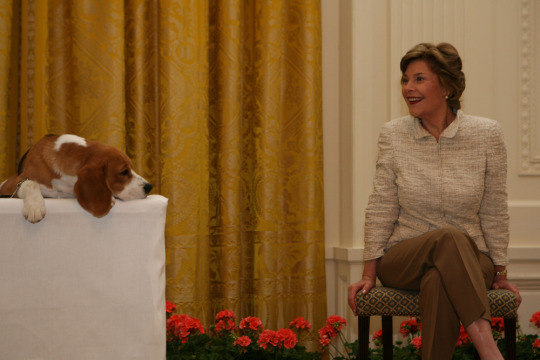
Mrs. Laura Bush meets the Westminster Kennel Club's 2008 Best in Show Winner, Uno, in the East Room on May 5, 2008.
Collection GWB-WHPO: Records of the White House Photo Office (George W. Bush Administration)
Series: Photographs Related to the George W. Bush Administration
Image description: Uno, a brown-and-white beagle, lies on a table covered in white fabric, with one paw over the edge of the table. He is looking at Mrs. Laura Bush, who is seated on a nearby chair and smiling. In the background is a dark gold curtain and pink flowers.
#archivesgov#March 5#2008#2000s#George W. Bush administration#Laura Bush#dog#beagle#Uno#please look up this dog#he also became a therapy dog#and lived on a ranch filled with rescue beagles
21 notes
·
View notes
Text


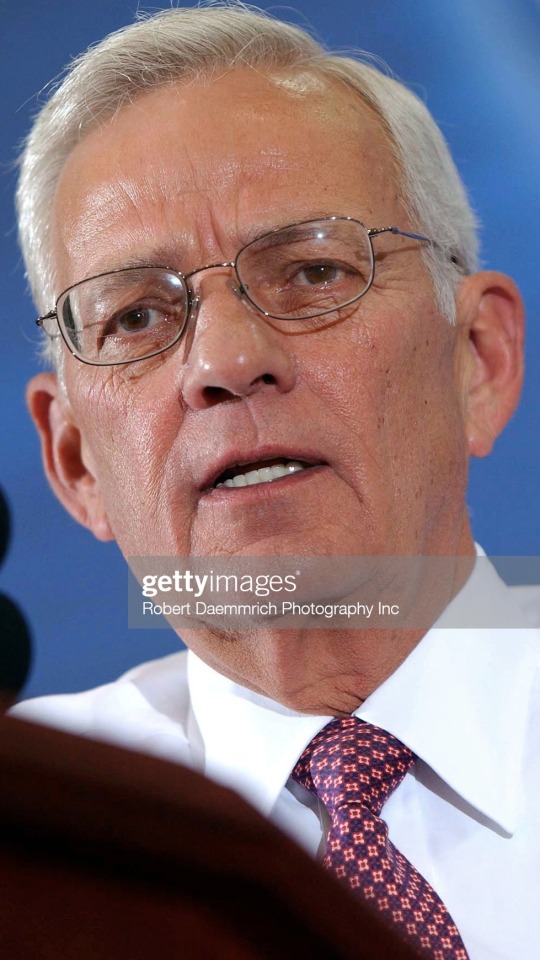
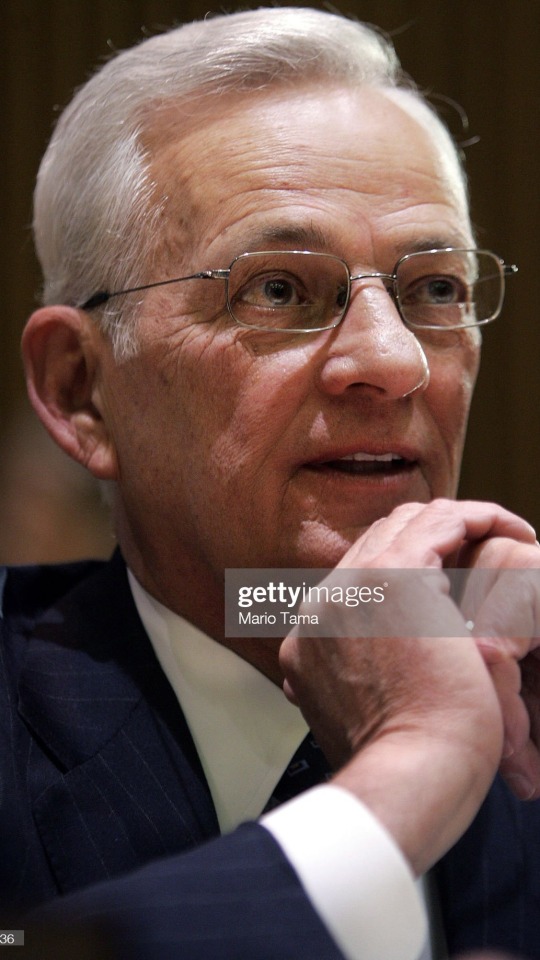

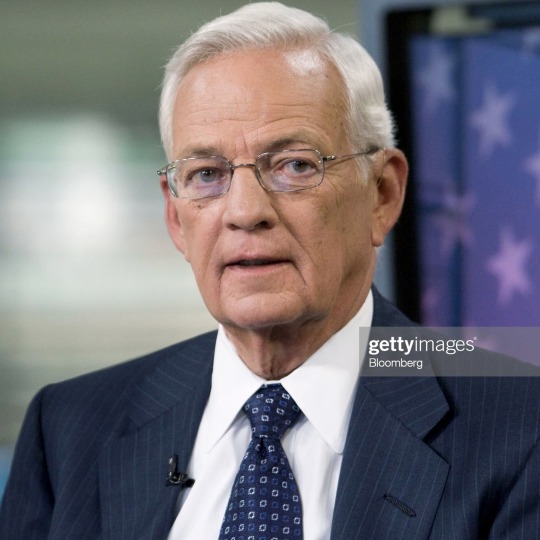

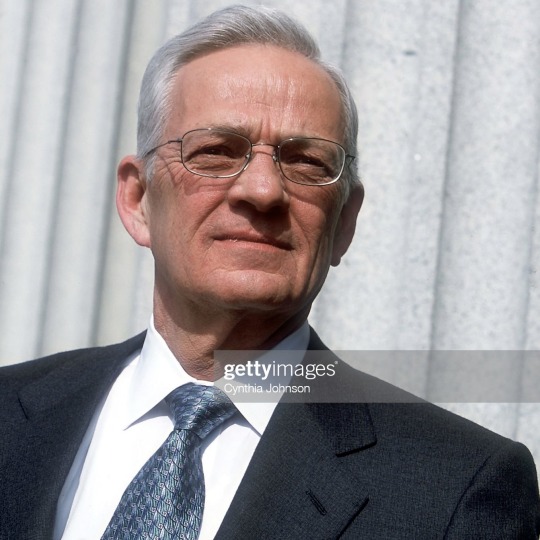
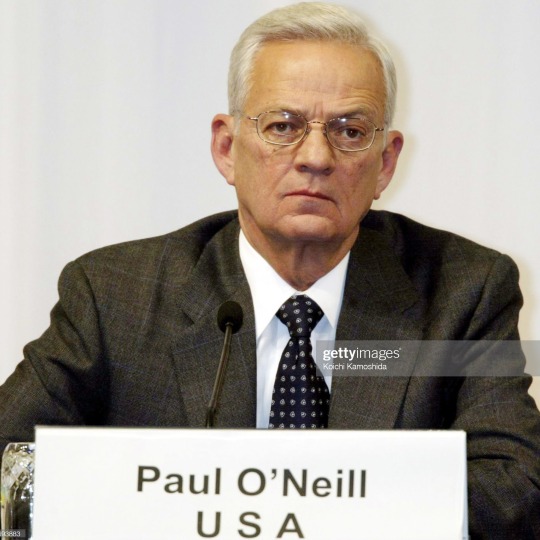

Paul H. O'Neill
#daddy#daddylove#hot daddy#daddywiki#handsome daddy#sexy daddy#americans#my favorite#daddies#daddyoftheday#mature daddy#silver fox#grey daddy#suited daddy#handsome#love him#Paul H. O'Neill#bush administration#george w. bush#republicans
92 notes
·
View notes
Text
i think one of the reasons politics seems to really break people's brains is because people see it as a series of (often moral) single issues instead of a chaotic and vast multi-level multi-player game where the stakes are real human suffering and lives
#i can't articulate it but i get the vibe that it's weirdly in part a remnant of george w bush era politics#related: i strongly think that probably the top foreign policy aim of the us govt right now#is to prevent the outbreak of regional war in the middle east (read: war between israel and iran which would ofc spread into regional war)#not supporting israel or facilitating genocide in palestine#like you can (and imo should) disagree with the biden administration's actions and approach here#but i don't think the biden team are either dumb or evil
3 notes
·
View notes
Text
whitewater, blackwater, what's next... clear water?
2 notes
·
View notes
Text
ughhh I checked out an audiobook for a book that I already read
#and I had issues with the book#I think I complained about it on here#ugh oh well at least it's got a full cast#so I think that adds something#I think it's also maybe easier to read it during the Biden administration#because she kept complaining about George W Bush#and like it's not that she was wrong#but it was hard to be like 'yes george w bush is the worst president ever' at that point#the audiobook does also keenly remind me that she is the voice of Violet in the Incredibles
5 notes
·
View notes
Text
We are having a discussion/debate about who was ultimately most responsible for the post-9/11 cock up in the Middle East and my vote is for Donald Rumsfeld.
Just, ya know, polite after dinner conversation as you do.
1 note
·
View note
Text
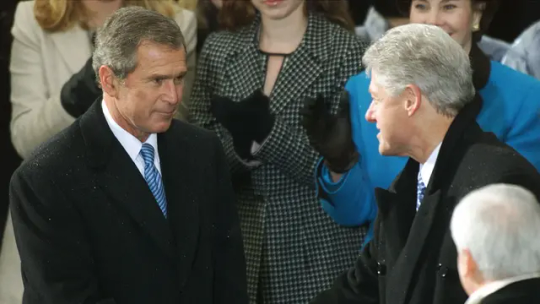
Their paths into politics could hardly have been more different, and their first encounter was rough. In 1999, both George W. [Bush], as Governor of Texas, and Jeb [Bush], newly elected in Florida, visited the White House during a Governors' conference. [President] Clinton liked Jeb right away but found George W. downright surly. Still, when Clinton's aides noted that the Texan seemed particularly uncomfortable, Clinton came to his defense: "Look, the guy's just being honest. What's he supposed to do, like me? I defeated his father. He loves his father. It doesn't bother me -- this is a contact sport." During the 2000 campaign, Clinton watched George W. with growing respect -- "compassionate conservatism" is a "genius slogan," he warned Al Gore's team -- and when George W. paid a visit after he won, Clinton came away from their meeting and a long lunch in the White House residence saying, "It's a mistake to underestimate him."
-- Nancy Gibbs and Michael Duffy, on the first impressions and interactions between then-President Bill Clinton and Texas Governor George W. Bush, TIME Magazine, August 3, 2015.
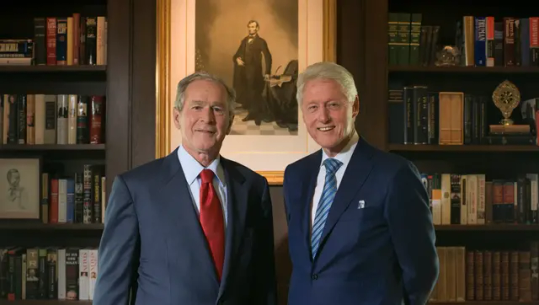
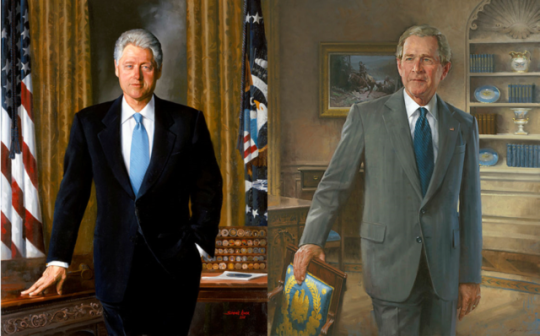
#History#Presidents#Bill Clinton#President Clinton#Clinton Administration#George W. Bush#President Bush#Bush 43#Presidential History#Presidential Relationships#Presidential Rivals#Politics#Political Rivalries#Political History#2000 Election#Bush vs. Gore#Bush Family#Presidency#Presidential Friendships#Presidential Rivalries
18 notes
·
View notes
Text
You might assume that Dr. Anthony Fauci, after 54 years working at the National Institutes of Health and helping save countless lives, has retired so he can rest. However, Dr. Fauci doesn’t have time to retire.
Last month, Fauci joined Georgetown University School of Medicine’s Department of Medicine in the Division of Infectious Diseases as a Distinguished Professor. He was also appointed to the university’s McCourt School of Public Policy.
“I’ve also been busy lecturing and writing my memoir, and since I’ve been out of the NIH for seven months, I’m not following the ins and outs of the government, but I am paying attention to what’s going on with PEPFAR,” he tells me.
PEPFAR is the U.S. President’s Emergency Plan for AIDS Relief, which was signed into law 20 years ago this summer by President George W. Bush. It serves as a conduit to providing HIV medications to individuals in impoverished nations who would otherwise lack access to these drugs.
When I spoke to Fauci a couple years ago on the 40th anniversary of the discovery of HIV, he cited the opportunity to be the architect of the program as one of his greatest achievements. "It is the largest commitment by any nation to address a single disease in history," he told me. "It's been an honor to help lead this. I really value my participation in this program that has already saved 15-18 million (in 2021) lives around the world."
“PEPFAR impact has been truly remarkable,” Fauci told me during our phone call Friday evening. "It is one of this country’s greatest global health policies in history. It’s been a resounding success, and has saved at least 25 million lives worldwide and it provides antiretroviral treatments for over 20 million people worldwide.”
However, groundless claims from anti-abortion activists have put the program in jeopardy. Conservative and anti-abortion groups sent a letter to Republicans in Congress who are responsible for PEPFAR’s reauthorization. The letter said that PEPFAR funds are “used by nongovernmental organizations that promote abortions and push a radical gender ideology abroad.” They provided no evidence to back their claim.
Also, the ultra-conservative Heritage Foundation released a report that said Congress needs to “reassess” PEPFAR. The report claimed, “The Biden Administration has misused the program as a well-funded vehicle to promote its domestic radical social agenda overseas, as it has done with other foreign aid programs.” This so-called report also did not provide any proof.
As a result, Republicans in Congress are threatening not to reauthorize the program.
“The idea that this program would be interrupted, despite its overwhelming success, is unfortunate,” Fauci said. “There’s a real danger to associate the program with cultural issues as opposed to scientific ones that clearly show PEPFAR is saving lives.”
“It seems paradoxical that abortion rights groups who fight for life want to interfere with a program that has saved millions of lives,” Fauci pointed out. “If the program doesn’t function, lives aren’t saved, millions of them.”
Instead of castigating the program, shouldn't these groups, as well as all Americans, be celebrating the 20th anniversary of this milestone? “What’s ironic is that it was signed into law by a conservative Republican President, and it is without question George W. Bush’s greatest achievement. It took years to put together, in a bipartisan way, and it is one of the world’s signature global health initiatives. The thought of it not being authorized is not only dangerous, but disastrous.”
#us politics#news#advocate#advocate.com#2023#republicans#conservatives#us house of representatives#National Institutes of Health#Dr. Anthony Fauci#Georgetown University School of Medicine#PEPFAR#aids epidemic#hiv/aids#HIV medications#anti-abortion activists#heritage foundation#Biden Administration#president george w. bush#international aid
124 notes
·
View notes
Text
Mitt Romney X Obama
Mitt: O-O-Obama San you can’t do this *blushes*
Obama: Sorry Kitten but the safety of the world depends on my pirate group
Mitt: Obama San!! You never listen to me! It’s like you hate our relationship
Mitt: If you don’t change I’m leaving
to be continued…
#political
1 note
·
View note
Photo

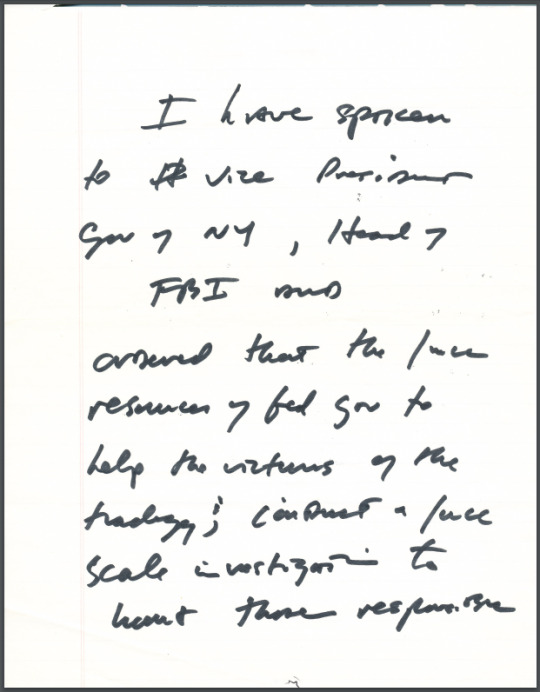
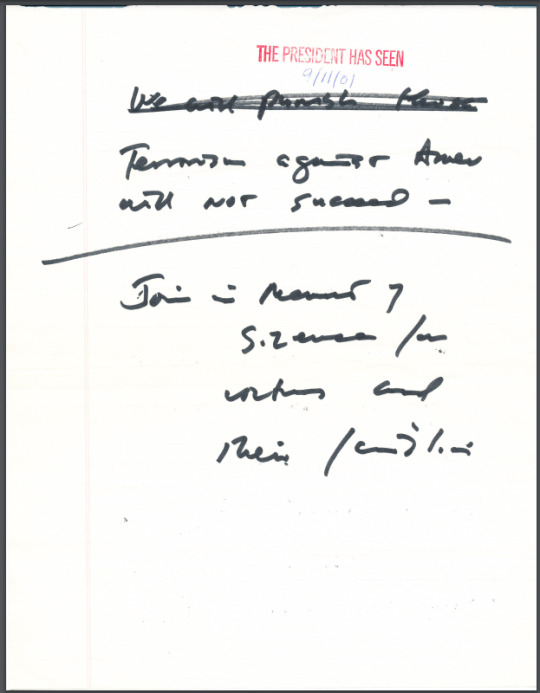
Notes written by President George W. Bush for the initial statement to the press after the terrorist attacks on September 11, 2001.
Series: Subject Files on Speeches, 1/20/2001 - 1/20/2009
Collection: Records of the White House Office of Records Management (George W. Bush Administration), 1/20/2001 - 1/20/2009
Transcription:
[handwritten; relatively thick black]
[page 1]
Today we have had
a nat'l tradegy [tragedy]
2 airplanes have crashed
into the World Trade
Center in an apparent
[deleted: atta] [deleted letter?] [unclear: terrorzt] [terrorist] attack
on our country --
[page 2]
I have spoken
to [deletion] vice President
Gov of NY , Head of
FBI and
ordered that the full
resources of fed gov to
help the victims of the
tradegy [tragedy] [unclear punctuation: semicolon?] conduct a full
scale investigation to
[unclear: hunt} those responsible
[page 3]
[stamped in red] THE PRESIDENT HAS SEEN
[handwritten in blue ink] 9/11/01
[handwritten in thicker black]
[deletion: We will punish those]
Terrorism against Amer
will not succeed --
[line across page]
Join in moment of
silence for
victims and
their families
65 notes
·
View notes
Text
Foreign Affairs: Gideon Rose: 'Iraq in Retrospect'
SourceForeign Affairs– welcome to Iraq, also known as Hell on Earth.
Source:FRS FreeState
“Ten years ago this week, the United States and a few of its allies invaded Iraq, writing the final chapter in Washington’s checkered decades-long relationship with Saddam Hussein. Thanks to problems of both conception and execution, the Iraq war ended up becoming the most egregious failure in half a century…
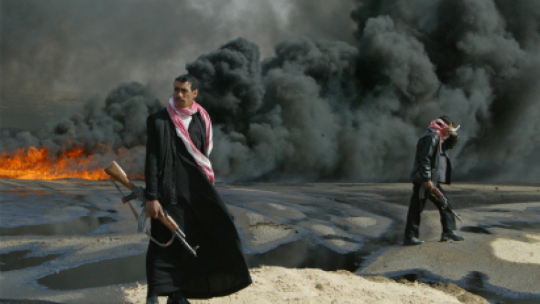
View On WordPress
#2003#2003 War in Iraq#America#Arabia#Carnegie Council#Center Right#George W. Bush#George W. Bush Administration#George W. Bush Presidency#Gideon Rose#Invasion of Iraq#Iraq#Iraq War#Neoconservatism#Neoconservatives#Preemptive War#Republican Party#The 2000s#The White House#United States#Washington#Washington DC
0 notes
Text
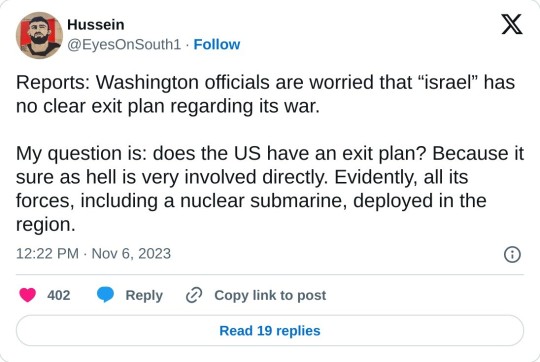
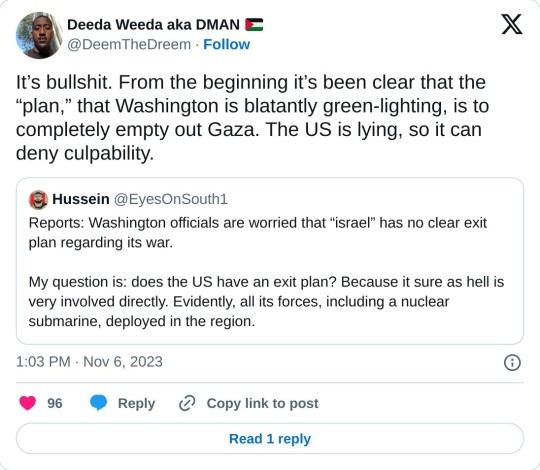
Biden could end this with just one call. Previous presidents had little issue curbing Israel. Reagan went against Israel several times including forcing them to halt the building of new settlements for a period of time and intervening to prevent Israel from killing 100 journalists in a hotel. George H W Bush delayed loan guarantees until Israel stopped building settlements in the West Bank and Gaza.
Biden, on the other hand, cosigned everything Israel did in 2021 and especially this year. In fact, any talk of humanitarian pauses and asking the other nations not to join in the fighting (his administration has been threatening Iran and Hezbollah, and presumably nations like Egypt) is merely meant to buy time for America to get its soldiers and weaponry in place for a regional war.
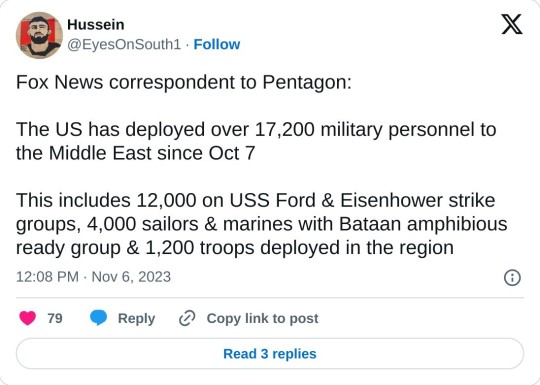
3K notes
·
View notes